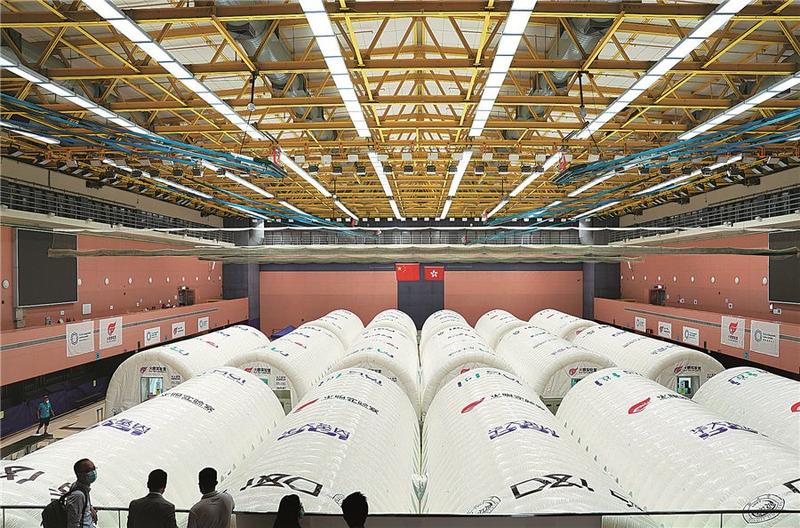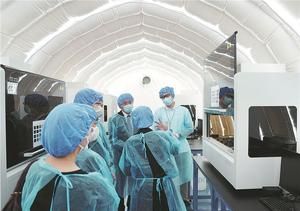 A view of Hong Kong's Fire Eye Laboratory, located at Sun Yat Sen Memorial Park Sports Center. (LI GANG / XINHUA)
A view of Hong Kong's Fire Eye Laboratory, located at Sun Yat Sen Memorial Park Sports Center. (LI GANG / XINHUA)
HONG KONG-Hong Kong's Fire Eye Laboratory, located at Sun Yat Sen Memorial Park Sports Center, has been busy with boxes of COVID-19 testing samples continually arriving since universal screening was launched in Hong Kong on Sept 1.
Hundreds of mainland nucleic acid testing support team members are on duty at the laboratory, which is running 24 hours a day. They are in a race against time to push forward with the virus testing work.
We wanted to finish the work as soon as possible to curb the epidemic, so as to allow Hong Kong residents to live a maskfree life
Xiao Fangzhen, member of the testing support team
"Every post at the laboratory is closely linked and indispensable," says Yu Dewen, leader of the nucleic acid testing team from Guangdong province.
At the request of the Hong Kong Special Administrative Region government, the central government set up a nucleic acid testing team to help Hong Kong implement the Universal Community Testing Program to enhance COVID-19 testing capacity.
ALSO READ: HK authorities laud testing campaign
Since Aug 2, more than 570 members of the testing team have arrived in Hong Kong from the mainland to carry out the lab testing work.
As the team members work long hours every day, diapers have become a necessity. "To save time, we try not to go to the toilet," Xiao Fangzhen, a member of the support team, says, noting that wearing diapers allows them to work in the laboratory for 12 hours nonstop.
Every time the team members enter the laboratory, they must change into a new set of protective equipment, including conjoined protective clothing, goggles, N95 masks and double gloves.
Food and drinks sent to the laboratory for the support team members by the HKSAR government are often left untouched.
 Visitors take a look inside the laboratory, where mainland nucleic acid testing support teams carry out work in the city. (LI GANG / XINHUA)
Visitors take a look inside the laboratory, where mainland nucleic acid testing support teams carry out work in the city. (LI GANG / XINHUA)
Xiao explains that team members usually have their meal before starting work and try not to eat during the course of their shift.
"We wanted to finish the work as soon as possible to curb the epidemic, so as to allow Hong Kong residents to live a mask-free life," Xiao says.
Unfortunately, many of the support team members have developed insomnia and other sleeping problems after being on night shifts for several days. Cai Yonglin, another team member, says that many of them did not have time to rest after arriving in Hong Kong and went straight to work in the laboratory after attending the training session.
READ MORE: Experts: Mass testing crucial to quelling virus spread
Since Cai learned that the support team's efforts and effectiveness has been highly appreciated by Hong Kong residents, he is determined to work harder to help uncover asymptomatic carriers of the virus.
"The sooner we find them, the lower the chances are that they will spread the disease," he says.
"There were four days when we tested more than 200,000 samples, which was satisfactory and had exceeded our expectations," Yu says.
As of Sunday morning, more than 1.67 million samples had been collected under the mass testing program, which concluded on Monday.


